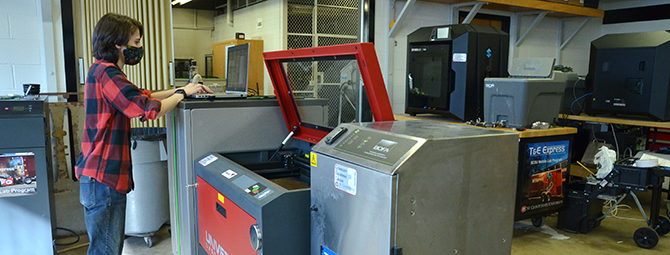The South Central Perkins Consortium of 25 schools in south central Minnesota has joined the TEC Network at St. Cloud State University.
The TEC Network is a series of middle and high schools throughout Minnesota that work with St. Cloud State University to gain access to the latest technology and engineering equipment and support for teacher training and curriculum development.
The network helps schools to provide classes and grow technical programs with a focus on manufacturing and construction, programs that had previously been cut or downsized by many districts. The network has worked with more than 25 schools and more than 30,000 students since it began in 2011.

The network grants member schools access to equipment like 3D printers, CNC equipment, plasma cutters, concrete and masonry tools, a virtual painter and more. In addition to the equipment, St. Cloud State supports member teachers with professional development workshops, mentorship training, a Youth Apprentice program, along with program review and development, and assessment and annual reports. Member schools seek matching funds from an industry partner to support their participation.
Having access to all this equipment at the high school level shows students that manufacturing is no longer a dark, dirty and dangerous career. It involves a lot of technical knowledge to program and use the equipment, said Dr. Kurt Helgeson, a founder of the TEC Network.
A tradition of supporting technology education
St. Cloud State has provided outreach to school districts in Technology and Engineering Education, Career and Technical Education and STEM education for many years. Since 2011, the university has focused on the T&E Express and providing professional development for teachers through summer workshops.
The TEC Network was formed in 2011 thanks to a donation from Russ Hagen that provided funding for the T&E Express. Helgeson, Schroll and Hentges used the funding to purchase equipment and leverage the support of Minnesota State grant funding and discounted equipment donations from equipment manufacturers to grow the program into what it is today. They then connected with schools and teachers throughout the state to offer training and deliver equipment each school year. TEAM Industries sponsored 10 schools in Northwest Minnesota for five years. Recently, they signed on for an additional five years of support for those schools. TEAM Industries focus was building the Youth apprenticeship program for students in their region.
The summer workshop program has also led to renewed interest in St. Cloud State’s Technology Education master’s degree program because teachers in the master’s program can count their workshop courses toward their degree when they apply them as part of their course credits.
During COVID-19 when schools switched to remote learning, the TEC Network was instrumental for many member teachers because Dr. Chuck Hentges, Mark Schroll and Helgeson showed how they could grant control to load settings for some machines on Zoom to allow students to program equipment remotely or run software on Chrome books with the teacher on site to load materials in to the machines. That allowed member teachers to continue teaching new skills in a way they otherwise wouldn’t have been able to, Helgeson said.
St. Cloud State now has more than $1 million worth of equipment that it lends out to member school districts. The program has funded the development of summer workshops for teachers and the on-campus Make It Space – in Headley Hall, where students from across campus take their ideas and make them into reality with laser cutters, 3D printers and other printing.
Students from majors in any department can bring their ideas to the Make It Space to develop prototypes. The Make It Space has led to expansion in other offerings such as the Huskies Invent, where students work with industry partners to solve real world solutions. During the event, students use Make It Space equipment to produce prototypes. At the start of COVID-19 when access to PPE was scarce, Hentges, Helgeson and Schroll used the Make It Space to print face shields for local healthcare and public transportation workers.
